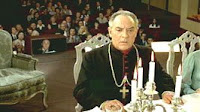"In a world as badly made as ours,
there is only one road -- rebellion."
. . . LUIS BUNUEL

The Discreet Charm of the Bourgeoisie
A Film by Luis Bunuel
Country :
Year : 1972
French / Spanish with English subtitles
Run time : 102 minutes
All movies toy with us, but the best ones have the nerve to admit it. Most movies pretend their stories are real and that we must take them seriously. Comedies are allowed to break the rules. Most of the films of Luis Bunuel are comedies in one way or another, but he doesn't go for gags and punch lines; his comedy is more like a dig in the ribs, sly and painful.

"The Discreet Charm of
 the Bourgeoisie" (1972) is about people who are trapped on the other side of the mirror: They constantly arrive for dinner and sometimes even sit down for it, but are never able to eat. They arrive on the wrong night, or are alarmed to find the corpse of the restaurant owner in the next room, or are interrupted by military maneuvers.
the Bourgeoisie" (1972) is about people who are trapped on the other side of the mirror: They constantly arrive for dinner and sometimes even sit down for it, but are never able to eat. They arrive on the wrong night, or are alarmed to find the corpse of the restaurant owner in the next room, or are interrupted by military maneuvers.Dinner is the central social ritual of the middle classes, a way of displaying wealth and good manners. It also offers the convenience of something to do (eat) and something to talk about (the food), and that is a great relief, since so many of the bourgeoisie have nothing much to talk about, and there are a great many things they hope will not be mentioned.
The joke in "The Discreet Charm of the Bourgeoisie" is the way Bunuel interrupts the meals with the secrets that lurk beneath the surface of his decaying European aristocracy: witlessness, adultery, drug dealing, cheating, military coups, perversion and the paralysis of boredom. His central characters are politicians, the military and the rich, but in a generous mood he throws in a supporting character to make fun of the church.
The movie is broken into self-contained sequences, showing the bland surface of polite society and the lusts that lurk beneat h.
h.
"The Discreet Charm of the Bourgeoisie" was Bunuel's most successful film; it made more money even than his famous "Belle de Jour" (1967), won the Oscar as best foreign film and was named the year's best by the National Society of Film Critics. It was released in a year when social unrest was at its height, the Vietnam War was in full flower, and the upper middle class was a fashionable target of disdain. How different to see it again in the 2000s, when affluence is once again praised and envied.
Luis Buñuel
Painting by Salvador Dali
22 February 1900,
one of the most original directors in the
history of the film medium,
“ I have a soft spot for secret passageways, bookshelves that open into silence, staircases that go down into a void, and hidden safes. I even have one myself, but I won't tell you where. At the other end of the spectrum are statistics which I hate with all my heart. “
Luis Buñuel was given a strict Jesuit education (which sowed the seeds of his obsession with both religion and subversive behavior). Bnuel subsequently moved to
With financial assistance from his mother and creative assistance from Dalí, he made his first film, the 17-minute Un chien andalou in 1929, and immediately catapulted himself into film history thanks to its shocking imagery (much of which - like the sliced eyeball at the beginning - still packs a punch even today). It made a deep impression on the Surrealist Group, who welcomed Buñuel into their ranks. The following year, sponsored by wealthy art patrons, he made his first feature, the scabrous witty and violent Âge d'or, L' (1930), which mercilessly attacked the church and the middle classes, themes that would preoccupy Buñuel for the rest of his career.

In 1961, General Franco, anxious to be seen to be supporting Spanish culture invited Buñuel back to his native country -and Bunuel promptly paid back by making Viridiana (1961), which was banned in Spain on the grounds of blasphemy, though it won the Palme d'Or at the Cannes Film Festival.
This inaugurated Buñuel's last great period when, he made seven extraordinary late masterpieces, starting with Journal d'une femme de chambre, Le (1964). The films showed that even in old age Buñuel had lost none of his youthful vigour. After saying that every one of his films from Belle de jour (1967) onwards would be his last, he finally kept his promise with Cet obscur objet du désir (1977), after which he wrote a memorable (if factually dubious) autobiography, in which he said he'd be happy to burn all the prints of all his films -a classic Surrealist gesture if ever there was one.




No comments:
Post a Comment